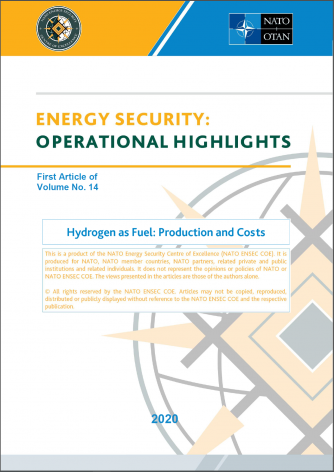Hydrogen as Fuel: Production and Costs
NATO Energy Security Centre of Excellence is proud to present the release of a study on ‘Hydrogen as Fuel: production and costs with a closer look to highly regulated market situations’ prepared by Dr. Jutta Lauf.
The article draws attention to important role of hydrogen in reducing the use of fossil fuels and mitigating the negative effects of global climate change. It introduces current processes and technologies in which electrolysers are used in production of hydrogen and presents the costs for installation and operation of electrolyser plants.
Despite that for energy industry the transformation to a carbon free electricity production is a challenging task, the conversion of the electricity generation seems to be the logical way for businesses to steer. On the grounds of that, by using Germany as a case study, this article reviews current processes and technologies used to produce electrolysers for hydrogen.
This study addresses important challenges:
- the availability of constant power sources to run electrolyser plants on a large scale and under full load for a sufficient time;
- profitability of these technologies, and;
- the economic potential of the usage of “surplus electricity” from renewable energy sources.
Additionally, this article indicates various technical solutions to reach electrolyser plants’ technological implementation, to improve profitability and even some financial insights following mentioned perspectives.
The analysis of this study provides important conclusions, including the number of precise thresholds per year for electrolyser plant profitable operation and the proposal of four key technical solutions to achieve technological implementation.
Read the study: https://www.enseccoe.org/data/public/uploads/2020/08/d1_nato-ensec-coe-oh-14-hydrogen-as-fuel-production-and-costs.pdf

